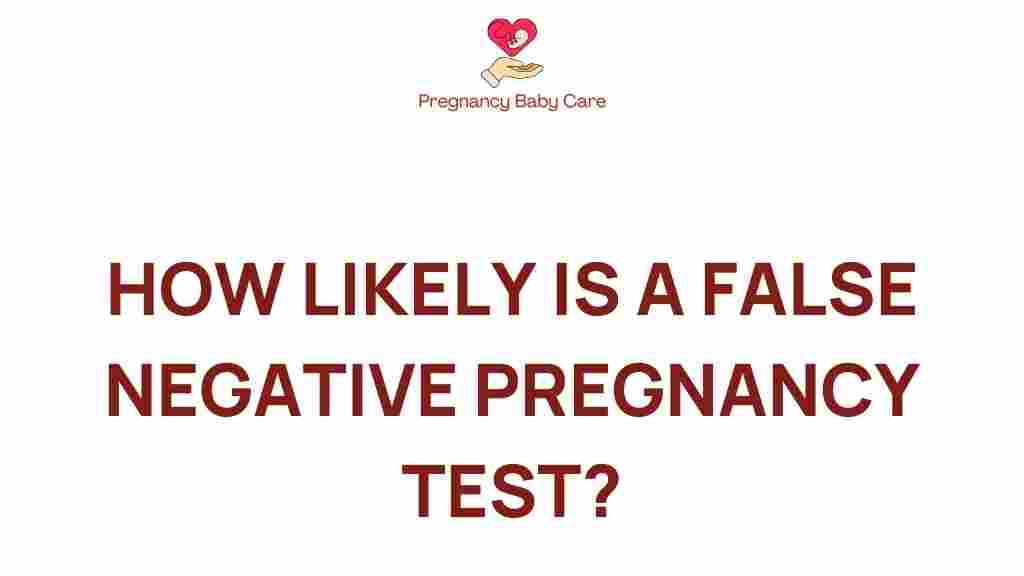The Surprising Truth: How Likely Are False Negative Pregnancy Tests?
When it comes to family planning and pregnancy, the accuracy of home pregnancy tests is a topic of great interest. Many women rely on these tests for early detection of pregnancy, but how reliable are they? One of the most concerning outcomes is the possibility of a false negative result. In this article, we will explore the truth behind false negatives in pregnancy tests, the factors that influence their accuracy, and tips for effective testing.
Understanding False Negatives
A false negative occurs when a pregnancy test indicates that a woman is not pregnant when she actually is. This misleading result can lead to confusion and emotional distress, especially for those eagerly hoping for a positive outcome. To understand how likely false negatives are, we need to look at the following factors:
- The timing of the test in relation to the menstrual cycle
- The sensitivity of the pregnancy test
- Hormone levels in the body
- Improper testing techniques
How Pregnancy Tests Work
Home pregnancy tests work by detecting the hormone human chorionic gonadotropin (hCG) in urine. This hormone is produced shortly after a fertilized egg attaches to the uterine lining. The level of hCG increases significantly in the early stages of pregnancy, making it possible to detect pregnancy just a few days after implantation.
Most home tests claim to be over 99% accurate when used correctly. However, the accuracy can vary based on several factors, which we will discuss in detail.
Timing Matters: When to Take a Pregnancy Test
One of the most critical factors affecting the accuracy of a pregnancy test is timing. The best time to take a test is:
- **After your missed period:** This is typically one to two weeks after conception, allowing hCG levels to rise sufficiently.
- **In the morning:** Testing first thing in the morning can yield the most accurate results since urine is more concentrated.
- **At least two weeks after potential conception:** This allows your body enough time to produce detectable levels of hCG.
Taking a test too early may result in a false negative because the hormone levels may not be high enough to trigger a positive result.
Understanding Hormone Levels and Their Impact
Hormone levels play a crucial role in the accuracy of pregnancy tests. Here’s what you need to know:
- **hCG levels vary:** Every woman’s body is different, and hCG levels can rise at different rates. Some women may take longer to produce enough hCG for a positive result.
- **Dilution of urine:** If you drink a lot of fluids before taking a test, it can dilute your urine and lower the concentration of hCG, leading to a possible false negative.
- **Chemical pregnancies:** In some cases, a woman may experience a very early miscarriage, which can result in a temporary increase in hCG followed by a drop, potentially causing confusion if tested at that time.
Testing Tips for Accurate Results
To minimize the chances of receiving a false negative result, consider the following testing tips:
- **Follow the instructions:** Always read the instructions provided with your pregnancy test carefully and follow them precisely.
- **Use a high-sensitivity test:** Some tests are designed to detect lower levels of hCG and may provide more reliable results earlier in the pregnancy.
- **Test multiple times:** If you suspect you are pregnant but receive a negative result, wait a few days and test again.
- **Consider a blood test:** If you continue to receive negative results but still suspect pregnancy, a healthcare provider can perform a blood test, which is more sensitive and can detect lower levels of hCG.
Common Reasons for False Negatives
Understanding the common reasons behind false negatives can help you better navigate your testing process:
- **Testing too early:** Taking a test before your missed period can yield a false negative.
- **Expired tests:** Always check the expiration date on your pregnancy test, as expired tests may not function properly.
- **Improper usage:** Not following the manufacturer’s instructions can lead to inaccurate results.
- **Hormonal fluctuations:** Certain hormonal imbalances or conditions can affect hCG levels and lead to misleading results.
Emotional Impact of False Negatives
Receiving a false negative can be emotionally taxing. It’s essential to remember that many women experience similar situations. If you find yourself in this position, consider the following:
- **Talk to someone:** Sharing your feelings with a friend or loved one can provide comfort.
- **Seek professional advice:** If you have concerns about your health or pregnancy, consult a healthcare professional for guidance.
- **Educate yourself:** Understanding the testing process can alleviate some anxiety and help you make informed decisions.
When to Consult a Doctor
If you continue to experience missed periods or unusual symptoms after multiple negative tests, it is advisable to consult a healthcare provider. They can help determine the cause of your symptoms and provide appropriate care. Additionally, if you have concerns about fertility or your menstrual cycle, a doctor can offer valuable insights and support.
Conclusion
In conclusion, while false negatives in pregnancy tests can be concerning, understanding the factors that influence their accuracy can help you navigate this emotional journey. Timing, hormone levels, and proper testing techniques are all crucial elements in obtaining a reliable result. If you suspect pregnancy and receive a negative result, don’t lose hope—consider retesting, consulting a healthcare provider, or exploring blood tests for more definitive answers.
For more information on pregnancy testing and related topics, feel free to explore additional resources here. Remember, knowledge is power, and being informed can lead to better decision-making in your journey through pregnancy and family planning.
For further reading on the science behind pregnancy tests, visit this informative article.
This article is in the category Pregnancy and created by PregnancyBabyCare Team
